Save Our Endangered Pollinators From the Scourge of Toxic Malathion
6,905 signatures toward our 30,000 Goal
Sponsor: The Rainforest Site
Malathion is wiping out endangered species, and government inaction is fueling the devastation. Act now to stop this deadly pesticide before it destroys what's left of our fragile ecosystems.

Malathion, one of the most toxic insecticides still widely used in the U.S., is a direct threat to more than 1,500 endangered species1. This neurotoxic chemical, originally developed for warfare, is being sprayed in sensitive habitats—putting butterflies, beetles, and dragonflies at risk of extinction. These species are already on the edge, and Malathion is making it worse.
Despite overwhelming evidence from scientists and conservationists, the U.S. Fish and Wildlife Service (FWS) recently concluded that Malathion does not pose a significant extinction risk to any protected species2. This decision sharply contrasts with the agency’s 2017 findings, which warned that Malathion jeopardized the survival of over 1,200 species3.
A Reversal Driven by Industry Pressure
In 2022, after pressure from the pesticide industry, the FWS reversed its previous findings4. This shocking reversal left conservationists questioning the motives behind the decision, accusing the agency of yielding to industry demands at the expense of wildlife. Thousands of animals and plants, including vital pollinators like the Karner blue butterfly, are left vulnerable as Malathion continues to be used.
Malathion’s Devastating Effects
The way Malathion works is simple—and deadly. It disrupts the nervous system of insects, killing not only pests but also pollinators and other non-target species. A single exposure to this chemical can wipe out entire populations of sensitive species, particularly those already struggling with habitat loss and climate change5.
The Environmental Protection Agency (EPA) has even acknowledged that Malathion affects 97% of the species protected under the Endangered Species Act, including mammals, birds, fish, and essential pollinators like bees and butterflies6.
Government Inaction, Ecosystem Collapse
The U.S. government’s failure to regulate Malathion more strictly is not only a failure to protect endangered species, but also a failure to protect us. Pollinators are crucial for food security and ecosystem balance. Without them, plants cannot reproduce, crops fail, and entire food chains collapse. Yet, the EPA and FWS continue to allow millions of pounds of Malathion to be sprayed across the U.S. every year, endangering ecosystems and the health of communities7.
Human health risks are also a concern. The World Health Organization has classified Malathion as “probably carcinogenic to humans.” Prolonged exposure has been linked to respiratory issues, fatigue, and more8.
Take Action Today
The time to act is now. Without immediate intervention, the damage from Malathion could be irreversible. Wildlife that has survived for centuries could vanish in the blink of an eye. Our ecosystems—and our own health—are at risk.
It’s time to demand accountability from the U.S. Fish and Wildlife Service. We must push for a ban on Malathion and protect the endangered species that are essential to the survival of our ecosystems.
Sign the petition to call for an immediate ban on Malathion. Help stop this toxic chemical from wiping out the last remaining populations of endangered species. Together, we can protect wildlife, restore balance to our ecosystems, and ensure a healthier future for all.
- Center for Biological Diversity (9 September 2024), "Lawsuit Filed Over Government Failure to Protect Endangered Species From Toxic Pesticide Malathion."
- U.S. Fish and Wildlife Service, "Biological and Conference Opinion for Registration of Malathion."
- Oliver Milman, The Guardian (7 April 2016), "Two widely used pesticides likely to harm 97% of endangered species in US."
- Associated Press, Tampa Bay Times (8 March 2022), "U.S. Officials Reverse Course on Pesticides Harm to Wildlife."
- Adebayo Adeyinka, Erind Muco; Angela C. Regina, Louisdon Pierre, StatPearls (12 November 2023), "Organophosphates."
- American Bird Conservancy (15 March 2022), "EPA Signals Continued Use of Insecticides Dangerous to Birds."
- U.S. Environmental Protection Agency (17 July 2024), "Malathion."
- World Health Organization (8 May 2016), "Use of malathion for vector control. Report of a WHO meeting, Geneva, 16–17 May 2016."
The Petition:
To the Director of the U.S. Fish and Wildlife Service,
We, the undersigned, urgently call on the U.S. Fish and Wildlife Service (FWS) to take immediate action and ban the use of the insecticide Malathion, one of the most harmful neurotoxic pesticides still allowed in the United States. Malathion's continued use poses an extreme and avoidable threat to the biodiversity of our country, particularly to endangered species such as butterflies, beetles, and dragonflies. These species, already on the brink of extinction, are being further endangered by the indiscriminate spraying of this toxic chemical.
In 2017, the FWS's own scientists identified that over 1,284 threatened and endangered species were at risk from Malathion exposure, with career experts warning that even a single exposure could be catastrophic. Unfortunately, this finding was overturned in 2022, allowing this harmful chemical to continue threatening some of the most delicate and vital ecosystems in the country. Despite minimal restrictions in specific areas, over 1,500 species remain unprotected, and the damage to pollinators and other wildlife continues unabated.
Given Malathion’s well-documented neurotoxicity and its continued use near habitats essential for species like Karner blue butterflies, Mitchell's satyr butterflies, and American burying beetles, the need for decisive conservation measures is urgent. Our pollinators, which are crucial for maintaining food security and healthy ecosystems, are being decimated, and the future of countless endangered plants that depend on these insects hangs in the balance.
We ask the U.S. Fish and Wildlife Service to recognize the gravity of the situation and prioritize the survival of these species by banning the use of Malathion. Enacting this ban will not only safeguard endangered species but will also promote a healthier environment for future generations of Americans.
By choosing conservation over toxic chemicals, we ensure a better future for all—humans, wildlife, and ecosystems alike.
Sincerely,